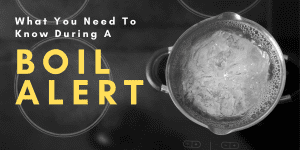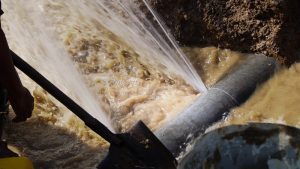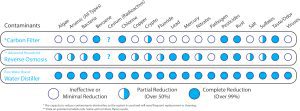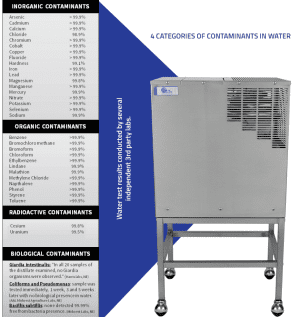The Danger Of Boil Alerts
A boil alert is issued when your local water supply may be contaminated with bacteria or other harmful microorganisms. It is important to follow a boil alert because drinking contaminated water can lead to serious illnesses, including gastroenteritis, dysentery, and hepatitis. Other symptoms of these illnesses include diarrhea, vomiting, abdominal cramps, and fever. In some cases, these illnesses can be life-threatening. Boiling water for at least one minute is recommended by the Centers for Disease Control and Prevention to kill bacteria and other microorganisms. During a boil alert, it is important to use boiled or bottled water for drinking, cooking, and brushing your teeth. Continue reading to learn more about boil alerts, and other options for safer drinking water.
Follow Boil Alerts Carefully
Flooding, natural disasters, or unexpected malfunctions to your local water supply can affect water quality, and often a boil alert will be put into place. When a large event happens, like a hurricane that impacts a lot of people, the task of getting clean water can be even more challenging. Each person must listen to local news carefully to understand what needs to be done to drinking water to make it safe. Always err on the side of caution, as flooding can contaminate water with anything from feces and medical waste to chemicals from nearby industrial facilities.
If you are in a disaster area or have had damages to your local water supply and are in the cleanup phase, you will likely need a lot of clean water to drink. Bottled water may be your only option. As services are restored, such as water, you may need to boil it before you can drink it. Most importantly, if you are unsure about the water, you should NOT drink it. Boiling can kill bacteria, but can also concentrate certain chemicals.
Related: Is Distilled Water Safe To Drink?
Local Tap Water
Your local public water system will let local residents know when the water is safe to drink and whether or not boiling tap water will be necessary. How do they know it is safe? Your local water system will run a series of tests on the water supply to be sure it is safe enough to drink. They will need to bring the pressure back up in the system, and also make sure that it is chlorinated to a safe level. Depending on the type of natural disaster and the location of the water system, it may take many days or weeks for the water to be deemed safe and pumped back into homes.
Related: Water Purification Systems – Water Distillation vs Reverse Osmosis
Well Water
If you own a well, you will need to go through a set of steps in order to be sure your water is safe to drink. In the case of a flood, you will first need to wait for the water to recede. Next, you will need to disinfect your well and plumbing and flush out each faucet for about 10 minutes. Then you will need to take water samples to your local lab to ensure that it is safe to drink. It is important to use NSF-rated bleach or hypochlorite for your well and not, for example, laundry bleach that is scented.
Related: The Best Well Water Purification Systems for Homes
How Long Does A Boil Alert Last?
A boil alert could be in effect for some time, depending on the problem, and can last anywhere from days to weeks or more. In fact, boil alerts happen all over the United States daily and for many reasons. For example, a water main might have broken; or an abundance of bird droppings might require that your local water company alert consumers to boil their tap water before drinking it. On any given day, for whatever reason, thousands of people are affected by a boil alert.
How to Boil Water for a Boil Alert
Once a boil alert is in effect, be careful to boil all water before consuming, cooking, brushing your teeth, and depending on the severity of the alert, before bathing in it. According to the Centers for Disease Control and Prevention (CDC), you should fill a large pot with water and bring it to an actual boil for at least one minute; then let the water cool and store it in a clean container for use. If you cannot boil water, you can disinfect it by using 1/8 teaspoon of bleach (must be non-scented) per one gallon of water. Mix it well and wait at least 30 minutes before drinking it. Make sure your containers are clean by sanitizing them with bleach as well. Rinse containers thoroughly before storing water.
Do not forget that anything that requires water, such as washing fruits and vegetables, cooking, mixing baby formula, mixing medications, making ice, washing dishes, or providing water to pets or plants must be done with boiled water.
Related: Using Distilled Water In Food Preparation, Cooking, and Baking
Filters Alone Will Not Clean Your Water
Using a filter like a common refrigerator filter or pitcher filter will not be enough to clean contaminated water. Reverse Osmosis systems are not a substitute for boiling water. The only mechanism you can trust to make your water 99.9% pure is a water distiller.
Water distillers boil water as part of the process of removing toxins. In fact, water distillers mimic the natural process by which we all get fresh water – evaporation and condensation. If you own a water distiller, your water is safe to drink during boil alerts because it is always boiled before you consume it. The steam rises and is then condensed and collected into a jar as liquid water, there is no need to worry about concentrating chemical contaminants as happens with boiling alone.
In a water distiller, the chemicals are left behind as waste in the boiling chamber; their boiling point is different than the water they are mixed with straight from the tap. However, it’s extremely important to choose a high-quality distiller, because not all distilled water is the same. Those who own a Pure and Secure water distiller are prepared for any possible contamination and enjoy 99.9% pure water every day.
Contact our Water Experts with any other questions or concerns by filling out the form below, or calling our office at (402) 467-9300.
Boil Alert Contact Form
If you enjoyed this blog, take a look at some of our other related articles:
- Are Water Distillers Worth The Money?
- 10 Reasons You Should Drink Distilled Water
- What is the Difference Between Water Purification and Water Distillation?
- Can I Plumb Distilled Water Throughout My House?









Why are so many Doctors stating that distilled water isn’t good for humans to consume because of accelerating Osteoporosis bone issues in elderly people? Is this a fact or fiction because my “89” year old father has been drinking distilled water from a Midi D unit I purchased over 35 years ago?Thanks in advance for the response.
that is something I have never heard of before. We have numerous doctors who will tell you otherwise. Dr. Bragg, Dr. Goldhamer, Dr. Weil, Dr. Clement and many others all swear by distilled water. If you are referencing a specific article, please forward it to us so we can research it and have a better answer to your question. As far as our research has shown, drinking distilled water does not lead to osteoperosis.
That will depend on what kind of doctor you are referring to. Doctors who are into pre-ventative medicine will not only endorse distilled water but promote and/or prescribe it to their patients. Many traditional doctors have not had enough training in nutrition or they would know better than to believe that distilled water has the power to remove minerals that are firmly embedded in our bodily structure. When one drinks distilled water is begins to change as soon as it enters our mouth. It begins to mix with any substances that are in our mouth to be come less pure. When this watery fluid reaches our stomach there are many more substances to work on. Certainly this water is no longer distilled! Granted, it is a bodily fluid that has fewer dissolved solids in it than if it had started out with water that had many dissolved solids in it originally. In other words, our alimentary canal can not be compared to a copper pipe. Distilled water passing through a copper pipe, would dissolve some of the copper from the pipe through which it passes.
That was well written.